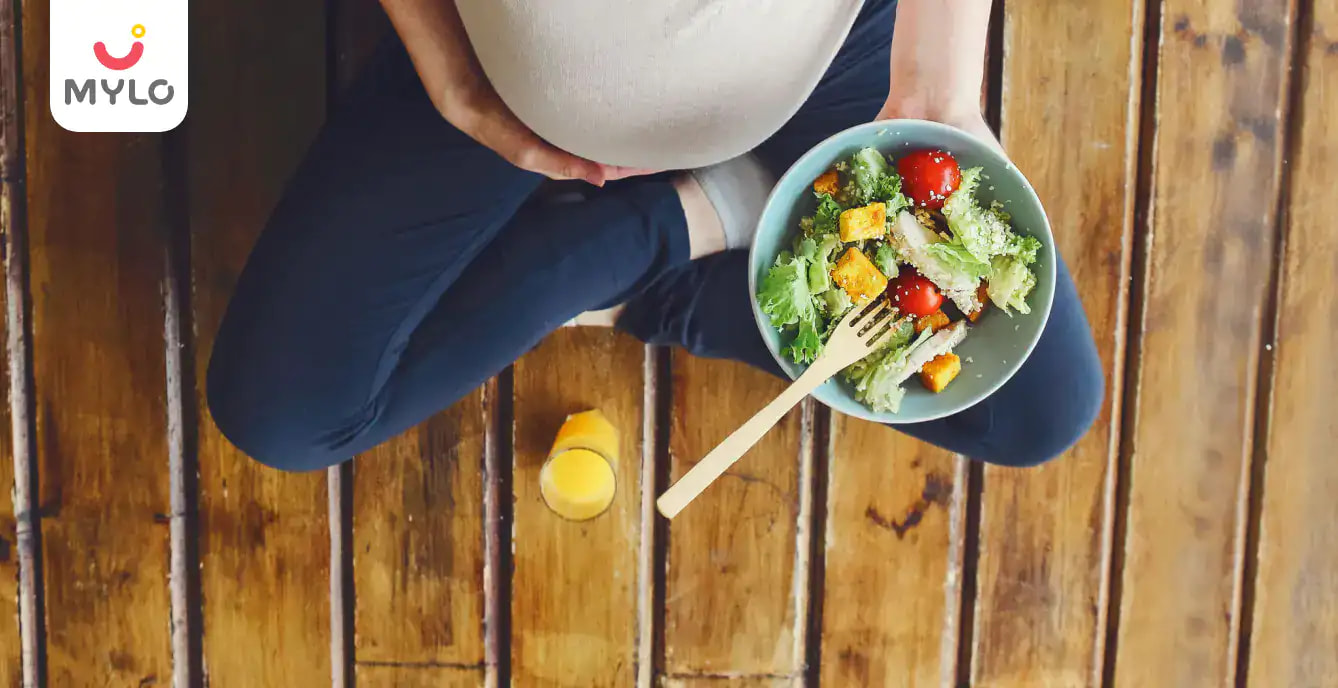Home

Pregnancy Best Foods

Healthy Pregnancy Food
In this Article

Pregnancy Best Foods
Healthy Pregnancy Food
Updated on 3 November 2023
A healthy diet is of utmost importance for every human. This becomes exceptionally important during pregnancy. A healthy antenatal diet plays a vital role in the development and growth of the baby and the expecting mother’s overall health. With a good balance of fruits, vegetables, nuts, grains, oils and proteins, a pregnant woman can do wonders for her unborn child.
Pregnancy Diet: Focus on These Essential Nutrients
How can expecting mothers ensure that they are eating a balanced and good diet? A pregnant woman’s diet should include a healthy mix of foods containing all the nutrients for the baby and the mother. As the baby grows, the expectant mother should eat a variety of nutrients that may also require customisation as per the trimesters. A consultation with the doctor is a must to ensure that the pregnant woman is eating the right foods. However, a majority of pregnancy diets include a focus on the following essential nutrients:
Iron-Rich Foods
Women are inundated with advice on consuming iron-rich foods throughout their life to produce haemoglobin to supply oxygen to their tissues. This important nutrient becomes even more essential during pregnancy as the body demands a higher oxygen supply for the baby. An iron deficiency in a pregnant mother increases the chances of developing iron deficiency anaemia, which causes regular headaches and fatigue. Severe cases of iron deficiency anaemia during pregnancy can result in premature birth or low birth weight. Iron-rich foods include fish, poultry, lean red meat, and beans.
Protein-Rich Foods
Protein is essential to promote the healthy growth of the baby’s organs and tissues. The recommended dietary allowance (RDA) of protein is at least 71 grams daily. This macronutrient is also required for the expecting mother’s uterine and breast tissue health. Additionally, protein is essential to increase blood supply; hence, the recommended intake increases every trimester. Healthy protein-rich foods to include in a pregnancy diet are chicken, nuts, peanut butter, cottage cheese, salmon, and beans.
Vitamin D-Rich Foods
Vitamin D is another crucial nutrient that requires additional focus to promote the unborn baby’s bones and teeth. It is also essential to improve the overall immunity of the body, which further assists in protecting the health of the expecting mother and unborn child. While sunlight is the best natural source of vitamin D, increasing pollution and harmful UV rays provide the opposite results. Hence, a vitamin D-rich antenatal diet can include foods like fatty fish like salmon, milk, and eggs.
Calcium-Rich Foods
Like protein-rich foods for pregnancy, the need for calcium-rich foods also doubles during pregnancy. Calcium is essential to strengthening the bones of the child and the mother. Some calcium-rich foods, such as Greek yoghurt, support the pregnant mother’s digestive system due to the presence of probiotic bacteria. Other healthy foods rich in calcium that should be consumed during pregnancy include milk, broccoli, kale cheese, salmon, spinach, and orange juice.
Folate and Folic Acid-Rich Foods
A type of vitamin B, folate is an essential nutrient for pregnant women as it helps avoid serious conditions of the brain and spinal cord defects. Folic acid is the synthetic form of folate found in fortified foods and supplements and decreases the risk of premature birth. Excellent sources of folate-rich foods include green and leafy vegetables, peas, citrus fruits, lentils, and dried beans. Folic acid-rich foods for pregnancy also include (with consultation) fortified cereals.
Foods to Avoid in Pregnancy
A pregnant woman should also be cautious of foods that are harmful during pregnancy. A few of these may differ based on an expecting mother’s health history and other health conditions. However, foods that health experts recommend strictly avoiding include:
-
Seafood high in mercury levels: While seafood is a good source of Omega-3 fatty acids and proteins essential for the healthy development of an unborn child’s brain and overall health, many fish contain high mercury levels. Consuming these can directly harm the baby’s nervous system. They include bigeye tuna, swordfish, king mackerel, and tilefish.
-
Undercooked meats and eggs: Consuming any form of uncooked meats and eggs highly increases the chances of getting severe bacterial food poisoning. This can affect the mother and the unborn child.
-
Excess Caffeine: Healthcare experts recommend limiting or avoiding the overall consumption of caffeine, which is found in coffee and tea. Caffeine can cause blood vessels in the uterus and the placenta to constrict significantly, reducing blood supply to the fetus. This further causes complications during birth, increasing the chances of harming the baby’s birth or growth.
Conclusion
Watching one’s diet during pregnancy plays a crucial role for the unborn child and the mother. It is important to consume and avoid foods per the doctor’s recommendation to experience a healthy and safe pregnancy.
You may like: Foods that Can Help Pregnant Women Go into Labor



Written by
Pooja Bhatia
Get baby's diet chart, and growth tips

Related Articles
RECENTLY PUBLISHED ARTICLES
our most recent articles

Diet & Nutrition
গর্ভাবস্থায় আলুবোখরা: উপকারিতা ও ঝুঁকি | Prunes During Pregnancy: Benefits & Risks in Bengali

Diet & Nutrition
গর্ভাবস্থায় হিং | ঝুঁকি, সুবিধা এবং অন্যান্য চিকিৎসা | Hing During Pregnancy | Risks, Benefits & Other Treatments in Bengali

Women Specific Issues
স্তনের উপর সাদা দাগ: লক্ষণ, কারণ এবং চিকিৎসা | White Spots on Nipple: Causes, Symptoms, and Treatments in Bengali

Diet & Nutrition
গর্ভাবস্থায় পোহা: উপকারিতা, ধরণ এবং রেসিপি | Poha During Pregnancy: Benefits, Types & Recipes in Bengali

Diet & Nutrition
গর্ভাবস্থায় মাছ: উপকারিতা এবং ঝুঁকি | Fish In Pregnancy: Benefits and Risks in Bengali

Diet & Nutrition
গর্ভাবস্থায় রেড ওয়াইন: পার্শ্ব প্রতিক্রিয়া এবং নির্দেশিকা | Red Wine During Pregnancy: Side Effects & Guidelines in Bengali
- ইনার থাই চ্যাফিং: কারণ, উপসর্গ এবং চিকিৎসা | Inner Thigh Chafing: Causes, Symptoms & Treatment in Bengali
- গর্ভাবস্থায় ব্রাউন রাইস: উপকারিতা ও সতর্কতা | Brown Rice During Pregnancy: Benefits & Precautions in Bengali
- Velamentous Cord Insertion - Precautions, Results & Safety
- Unlock the Secret to Flawless Skin: 7 Must-Have Qualities in a Face Serum
- Unlock the Secret to Radiant Skin: How Vitamin C Serum Can Transform Your Complexion
- Gender No Bar: 10 Reasons Why Everyone Needs a Body Lotion
- Unlock the Secret to Radiant Skin How to Choose the Perfect Body Lotion for Your Skin Type
- Top 10 Reasons to Apply a Body Lotion After Every Bath
- Communication in Toddlers: Milestones & Activities
- How to Improve Vocabulary for Toddlers?
- A Comprehensive Guide to Understanding Placenta Accreta
- Vulvovaginitis in Toddlers Causes, Symptoms and Treatment
- A Comprehensive Guide to Understanding Cerebral Palsy in Children
- Bitter Taste in Mouth During Pregnancy: Understanding the Causes and Remedies


AWARDS AND RECOGNITION

Mylo wins Forbes D2C Disruptor award

Mylo wins The Economic Times Promising Brands 2022
AS SEEN IN

- Mylo Care: Effective and science-backed personal care and wellness solutions for a joyful you.
- Mylo Baby: Science-backed, gentle and effective personal care & hygiene range for your little one.
- Mylo Community: Trusted and empathetic community of 10mn+ parents and experts.
Product Categories
baby carrier | baby soap | baby wipes | stretch marks cream | baby cream | baby shampoo | baby massage oil | baby hair oil | stretch marks oil | baby body wash | baby powder | baby lotion | diaper rash cream | newborn diapers | teether | baby kajal | baby diapers | cloth diapers |




